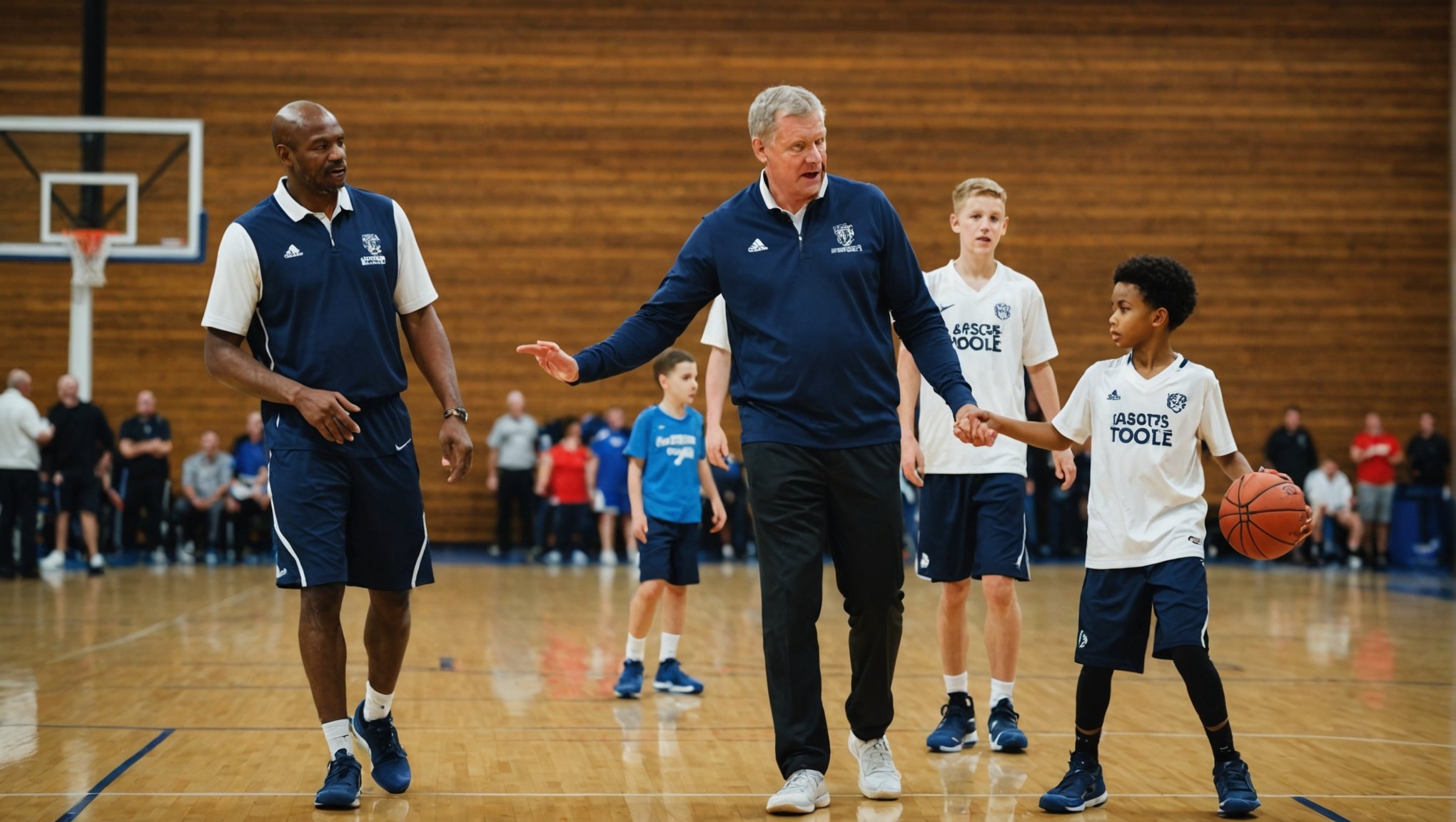Parental engagement significantly influences young basketball talent in the UK. Encouragement, support, and involvement from parents can shape a child's passion for the sport, impacting their dedication and performance. From providing transportation to practices to fostering a positive mindset, parents play an essential role in nurturing athletic abilities. Exploring these dynamics reveals how collaborative efforts between families and athletes lead to success both on and off the court. Understanding this can help coaches and clubs enhance their programs, promoting a stronger, more supportive basketball community.
Importance of Parental Engagement in Youth Sports
Parental engagement plays a crucial role in the realm of youth sports, significantly influencing a child's athletic journey and personal development. When parents actively participate, it often leads to improved performance and a more enriching sports experience for young athletes.
Additional reading : Unlocking Global Talent: Strategies for UK Basketball Academies to Draw International Athletes
The psychological impact of parental support cannot be understated. Young athletes who receive encouragement and constructive feedback from their parents are more likely to develop confidence and resilience. This emotional backing is particularly vital in sports like basketball, where talent development hinges not only on physical prowess but also on mental fortitude.
Statistical insights reveal a strong correlation between parental engagement and enhanced performance in youth sports. Studies indicate that children with supportive parents are more engaged and motivated, often showing higher levels of commitment and enthusiasm. This, in turn, fosters a positive environment where young athletes can thrive, honing their skills and nurturing their passion for the sport.
Have you seen this : Strategies for UK Basketball Clubs to Boost Fan Engagement During Games
In essence, parental involvement is not just beneficial but essential for the holistic development of young athletes. By fostering a supportive atmosphere, parents can significantly contribute to their child's success and well-being in the competitive world of youth sports.
Strategies for Effective Parental Involvement
In the realm of youth basketball, employing effective parental involvement strategies can greatly enhance a child's athletic experience. A key aspect is establishing clear and open communication between parents and coaches. This involves regular meetings or check-ins to discuss the athlete's progress, goals, and any concerns. By maintaining a dialogue, parents can better understand the expectations and dynamics of the team, allowing for more informed support methods at home.
Balancing support and pressure is crucial. Parents should aim to encourage without overwhelming their child. This balance can be achieved by focusing on effort and personal growth rather than just performance outcomes. Encouraging young athletes to set personal goals and celebrating small successes can foster motivation and reduce stress.
Creating a supportive home environment is another vital component. Parents can designate a specific space for basketball practice, ensuring it's safe and equipped with necessary materials. Additionally, being present during practice sessions and showing genuine interest in their child's progress can reinforce the athlete's commitment and enthusiasm.
By adopting these strategies, parents can positively influence their child's journey in youth basketball, promoting both skill development and personal growth.
Benefits of Parental Engagement
Parental involvement in youth sports offers numerous advantages, significantly impacting a young athlete's journey. One of the primary benefits of parental support is the enhancement of athletic performance. When parents actively engage, children often feel more motivated and encouraged, leading to improved skills and greater dedication to their sport. This involvement can manifest in various forms, such as attending games, providing constructive feedback, or facilitating additional practice opportunities.
Beyond physical performance, parental engagement fosters essential social benefits. Young athletes learn valuable lessons in teamwork and community building. These experiences can lead to lasting friendships and a sense of belonging within a team environment. The presence of supportive parents at sporting events also reinforces the importance of collaboration and mutual respect among teammates.
Moreover, emotional support from parents is crucial in developing resilience and effective coping strategies. Young athletes often face challenges and setbacks, and having a reliable support system helps them navigate these hurdles with confidence. Parents can teach their children how to handle pressure, manage disappointment, and celebrate achievements, contributing to their overall emotional well-being. This holistic support not only benefits the athlete's sports performance but also their personal growth and development.
Case Studies of Successful Parental Engagement
In examining case studies of successful parental involvement in youth basketball programs, several examples from the UK stand out. These programs have demonstrated how active participation from parents can lead to remarkable athlete success.
One such example is the Manchester Youth Basketball Program, which has seen significant achievements. Here, parents are not only encouraged to attend games but are also involved in organizing events and supporting training sessions. This level of engagement has resulted in young athletes showing improved performance and commitment.
Another noteworthy case is the London Junior Hoops Initiative, which emphasizes the importance of parental workshops. These workshops equip parents with strategies to support their children effectively, focusing on emotional and mental well-being. Consequently, the athletes in this program have shown enhanced resilience and teamwork skills.
From these case studies, several lessons emerge that can be applied broadly:
- Active participation in both games and training sessions boosts athlete morale.
- Providing parental education on supporting mental health is crucial.
- Encouraging parents to take on supportive roles within programs fosters a stronger community.
These examples highlight the profound impact of parental involvement, offering a blueprint for other youth basketball programs aiming for similar success.
Expert Opinions on Parental Engagement
In the world of youth development, expert opinions highlight the critical role parents play in nurturing young athletes. According to sports psychology, parental involvement is not merely beneficial but essential for a child's holistic growth in sports. This perspective is supported by numerous sports psychologists who emphasize the psychological and emotional benefits of active parental engagement.
Interviews with coaches reveal that effective parental involvement can significantly enhance an athlete's experience. Coaches often note that when parents understand the dynamics of the sport and offer support without exerting pressure, athletes tend to perform better and enjoy the sport more. This balance allows young athletes to develop a healthy relationship with sports, fostering both skill and personal growth.
Research findings further underscore the impact of parental support in sports. Studies consistently show that children with engaged parents exhibit higher levels of motivation, resilience, and commitment. These attributes are crucial for success in youth sports, where mental fortitude is as important as physical ability. By understanding these insights, parents can better support their children, contributing positively to their athletic journey and overall development.
Psychological and Social Impact of Parental Support
Parental support in youth sports plays a pivotal role in shaping a child's psychological and social development. The psychological impact of having supportive parents is profound, as it helps young athletes build self-esteem and confidence. When parents provide consistent encouragement and constructive feedback, children are more likely to approach challenges with a positive mindset, fostering resilience and perseverance.
Beyond psychological benefits, parental involvement significantly influences a child's social development. Sports serve as a platform for young athletes to learn crucial social skills, such as teamwork, communication, and leadership. Parents who actively engage in their child's sporting activities can reinforce these skills by modelling positive social interactions and encouraging collaboration.
Young athletes often face pressure and stress in competitive environments. Here, parents play a crucial role in teaching effective coping mechanisms. By guiding their children in managing emotions and stress, parents help them develop strategies to handle pressure constructively. This support not only enhances the child's sports performance but also equips them with valuable life skills.
In essence, parental support is indispensable in nurturing both the psychological and social growth of young athletes, ultimately contributing to their overall well-being and success.
Practical Tips for Parents
Supporting your child in youth basketball requires a thoughtful approach. Here are some engagement techniques to consider:
1. Active Participation: Attend games and practices to show your interest. Your presence can boost your child's confidence and motivation. However, avoid coaching from the sidelines; let the coach guide the team.
2. Encourage, Don't Pressure: Focus on effort rather than just results. Celebrate personal achievements and improvements, no matter how small. This encourages a growth mindset and reduces stress.
3. Educate Yourself: Understanding the basics of basketball can enhance your support. Resources such as books, online courses, and workshops are available to help parents grasp the sport's fundamentals.
4. Open Communication: Regularly discuss your child's experiences and feelings about the sport. This helps you understand their needs and challenges, fostering a supportive environment.
5. Foster Independence: Allow your child to take responsibility for their practice and game preparation. This builds autonomy and self-discipline.
6. Positive Reinforcement: Use positive language and reinforcement to build your child's self-esteem. Highlight their strengths and encourage perseverance.
By implementing these tips for parents, you can create a nurturing environment that supports your child's athletic and personal growth in youth basketball.
Successful Programs and Initiatives in the UK
In the UK, youth sports initiatives have made significant strides in promoting parental engagement, particularly within basketball programs. These initiatives are spearheaded by local clubs and organizations that recognize the importance of involving parents in their children's athletic journeys.
Local clubs play a pivotal role by organizing workshops and events that encourage parents to participate actively. These programs are designed to educate parents on how to support their young athletes effectively, focusing on both mental and physical aspects of sports. By providing resources and guidance, clubs empower parents to become active contributors to their child's development.
Community support is further bolstered through events that foster strong parent-athlete relationships. For instance, family-oriented basketball tournaments and social gatherings offer opportunities for parents to engage with coaches and other families. These events create a sense of camaraderie and shared purpose, reinforcing the community's role in nurturing young talent.
Highlighting successful UK basketball programs, such as the Manchester Youth Basketball Program, demonstrates the profound impact of parental involvement. By integrating parents into the fabric of youth sports initiatives, these programs not only enhance athletic performance but also strengthen community bonds, ensuring a supportive environment for young athletes.
Challenges of Parental Engagement
Engaging effectively in youth sports presents various challenges for parents, often stemming from common barriers to support. One significant issue is balancing involvement without crossing into over-involvement, which can lead to undue pressure on young athletes. When parents become overly invested, it may result in increased stress and burnout for the child, negatively impacting their enjoyment and performance in the sport.
Challenges in parental involvement often include time constraints, lack of understanding of the sport, and difficulty in maintaining open communication with coaches. These barriers can hinder a parent's ability to provide the necessary support and encouragement, affecting the child's athletic journey and personal development.
To overcome these challenges, parents can adopt strategies that promote effective support. This includes setting realistic expectations and focusing on the child's effort and enjoyment rather than solely on outcomes. Additionally, parents should seek to educate themselves about the sport, which can enhance their understanding and ability to engage meaningfully. Establishing a strong line of communication with coaches can also facilitate a more supportive environment, allowing parents to align their efforts with the team's goals and dynamics.
By addressing these barriers, parents can better navigate the complexities of supporting their young athletes in youth sports.
Future Directions for Parental Engagement in Basketball
In the evolving landscape of youth sports, emerging trends in parental engagement are reshaping how parents support their children in basketball. As we look to the future of youth sports, a key trend is the increasing use of technology to enhance parental involvement. Digital platforms now offer parents real-time updates on their child's progress, enabling more informed and timely support.
The role of technology extends beyond mere communication. Apps and online resources provide parents with tools to track performance metrics, access training videos, and engage with coaches. This technological integration allows for a more personalized approach to supporting young athletes, catering to their individual needs and development.
Looking ahead, the vision for parental engagement in sports in the UK involves creating a more inclusive and supportive environment. This includes fostering stronger community ties and encouraging collaborative efforts between parents, coaches, and clubs. By embracing these trends, the future of youth sports promises a holistic approach where parents are not just spectators but active participants in their child's athletic journey. This shift aims to nurture not only athletic skills but also the personal growth of young athletes, ensuring a balanced and enriching sports experience.













